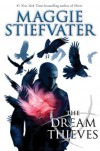
Shadow and Bone is a very difficult book for me to review because even as I was reading it, I kept thinking "I should love this but I don't." There was nothing overtly offensive about this novel. In fact, on its surface it's quite lovely. The world that Bardugo has created is unique and there was no obvious world building errors, the protagonist was not mind-numbingly stupid or irritatingly arrogant, her love interest wasn't an abusive jerk, and I fell in love with Bardugo's writing style. The prose flow smoothly and the descriptions are rich and beautiful, so beautiful in fact that I didn't even mind that there was a little too much telling and not enough showing because everything is told in such a pretty way.
The problem for me was that while Shadow and Bone is quite a beautiful book, I found that it was lacking in substance. The world, the characters, the relationships, and the plot were very shallow in their construction. Ravka is vast and unique but Bardugo only scratches the surface in terms of religion, politics, and culture. While there is some commentary on the inequality between the wealthy and the poor, this book never delves into the deeper social issues that plague the world, nor is the reader given much insight into the role of religion in society. Although the main character spends a majority of the book at court, there is no real discussion of the political climate or the courtly politics.
Instead the plot revolves around a high school-like atmosphere with mean girl cliques, a love triangle including a not-so-plain average girl and two good looking guys, and parties where the heroine is paraded around in beautiful clothing while everyone marvels at her. Does any of this sound familiar? If you frequent the YA section of bookstores, then it should because these plot points are found in a majority of the YA novels published these days. Shadow and Bone even includes a "slutty" beautiful rival who hates the heroine because she's jealous.
I also found the characterization to be entirely too shallow, which made it hard for me to connect with any of the characters. Alina is your typical plain jane who is really a special snowflake. Her character was severely lacking in both strength and initiative. Mal fills the role of the noble protective love interest without any real flaws, while the Darkling is the dark brooding bad boy. Of these three, only the Darkling shows any spark of complexity but there wasn't enough insight given into his motivation and history to truly call him a complex character.
Overall, I enjoyed this book mainly because of the writing, which often dazzled me into forgetting about the novel's shortcomings. I'll probably check out the sequel if only so I can devour more of Bardugo's writing.







